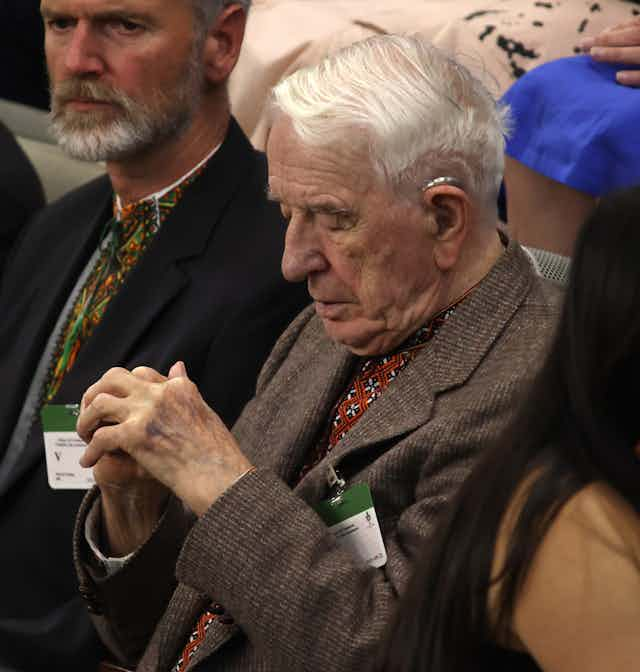Anthony Rota, the speaker of Canada’s House of Commons, has resigned from his post after inviting “war hero” Yaroslav Hunka to Parliament to take in the recent appearance of Ukrainian President Volodymyr Zelenskyy.
That invitation — and the two subsequent standing ovations Hunka received from Prime Minister Justin Trudeau, MPs of all parties and Zelenskyy — ignited an international uproar.
Hunka, now 98, served in a Nazi unit known as the 14th Waffen Grenadier Division of the SS, fighting alongside Germany in the Second World War. The unit reportedly participated in a massacre of Jews and ethnic Poles.
Jewish organizations and Poland demanded an apology from the Canadian government and Poland says it’s taking steps to extradite Hunka.
Opposition leader Pierre Poilievre has also accused Trudeau of being responsible for Hunka’s invitation.
In Moscow, the Kremlin maintained it was “outrageous” that Canada honoured a Nazi as a hero.
The unit’s history
The scandal illustrates a lack of knowledge among Canada’s political leaders about the eastern front during the Second World War. It also shows the close ties between the conflict and Russia’s invasion of Ukraine in February 2022.
The Germans initially deployed the unit to fight the advancing Soviet army, which was moving westward. Local Ukrainians were divided over its formation, some considering it mere “cannon fodder” for the German army.
The unit lost thousands of troops at the Battle of Brody but was later restored and took part in operations in Poland, Slovenia and Slovakia.
In May 1945, it became the 1st Ukrainian Division and surrendered to the western allies. Many came to Canada as a result of a cabinet-level exemption for SS members in 1950. Hunka settled in Canada in 1954.
Whitewashing accusations
The history of the SS Division and the arrival of some of its members in Canada were featured in the Deschenes Commission Report of 1985-86, which cleared most soldiers of war crimes.
But the opening of former Soviet archives has led to new studies, some of which have accused the Canadian commission of whitewashing the past.
Over the past few years, Russia has paid close attention to the Second World War — dubbed the “Great Patriotic War” — and has created new narratives to condemn what Vladimir Putin calls the “rehabilitation of Nazism” in Ukraine.
Putin’s speeches depict the war in Ukraine as aimed at “saving Russian civilization.” He accuses the West of promoting lies reminiscent of the propaganda of infamous Nazi Joseph Goebbels.
In Russia, there is an investigation into the “genocide of Russians” during the Second World War. Burial sites are uncovered, and the number of war dead has increased. Russian courts consider any alternative accounts to the official narrative to be historical revisionism and a criminal offence.
One such transgressor is imprisoned opposition leader Alexei Navalny — vilified for “insulting” a Second World War veteran — but the list is a very long one. Contemporary Ukraine fits into this false narrative: a state run by neo-Nazis since the Maidan uprising of 2014.

Ammunition to Russia
In this way, the past has merged with the present and is reborn. Russia seeks evidence in western countries that justifies its propaganda, and Canadian Parliament has provided it with much-needed ammunition for a tired and erroneous argument.
So how should Canada respond to the worldwide criticism?
Firstly, the murders of Ukrainian Jews during the Second World War must be remembered, and the complex context of Ukraine during the Second World War must be clarified.
Ukraine was the largest ethnic group in Europe to be denied its own state after the Paris Peace treaties that ended the First World War. These agreements divided Ukrainian ethnic territories among Poland, Czechoslovakia, Romania and mostly the Soviet Union.
The quest for independence endured amid the brutal Holodomor — in which millions of Ukrainians were deliberately starved by the Soviets in eastern Ukraine in the early 1930s — and by Polish pacification in the western territories.

In response, many Ukrainians in Poland abandoned democratic politics in the 1930s and joined extreme nationalist formations. When war broke out, the Nazis offered new opportunities to form a Ukrainian state.
That history is too complex to be outlined here. Suffice it to say that Nazi occupation failed to provide support for Ukrainian statehood, but some Ukrainians in the Organisation of Ukrainian Nationalists (OUN) and the Ukrainian Insurgent Army (UPA), as well as those in the 14th SS Division, committed war crimes. That fact should be acknowledged and accepted.
Ukraine more democratic than Russia
In the current era, there are no neo-Nazis in the Ukrainian government formed in 2019. Ukraine is far more democratic than Russia. There are far more neo-Nazis in Russia than in Ukraine.
So, Russia must return over and over to the Great Patriotic War to justify its argument — that Russia “saved” Europe and democracy.
Russia has obvious targets in Canada:
— Finance Minister Chrystia Freeland’s grandfather lived under Nazi occupation, so therefore he must be a war criminal, according to Russian propaganda.
— Ukrainians in Edmonton maintain a bust of Roman Shukhevych, the commander of UPA.
— In Oakville, Ont., there’s a cemetery honouring the SS Division.
Accuracy about the Second World War can dispel Russian myth-making and expose its current imperialistic and savage war aims in Ukraine.
Ukrainians are the victims here, not the Russian regime. Ukraine is not the criminal. Canadian Jews support Ukraine and Zelenskyy too.
But honesty must start at home, with the Liberal government. It needs to do a lot more homework on the complicated history of eastern Europe during the Second World War.

